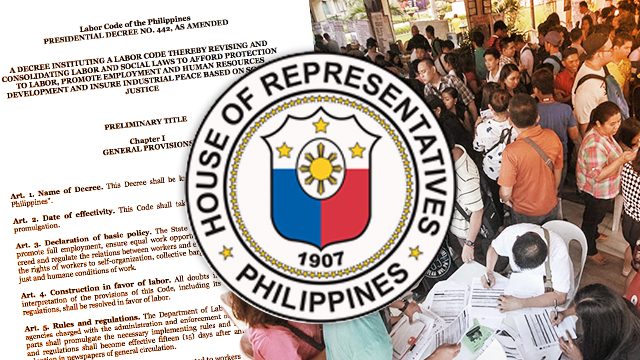SUMMARY
This is AI generated summarization, which may have errors. For context, always refer to the full article.

MANILA, Philippines – The House of Representatives’ committee on labor and employment will discuss two proposed bills that seek to raise penalties for companies not complying with mandated basic wages and push for strict implementation of social security and welfare benefits.
House Bill 5018 (HB 5018) proposes an amendment to the Labor Code of the Philippines (Presidential Decree 442; PD 442) to further ensure an employee’s right to wages, as well as wage-related benefits and social security and welfare benefits.
Also on the table is House Bill 356 (HB 356) by Representative Emmiline Aglipay-Villar, an amendment to Section 12 of the Wage Rationalization Act (Republic Act 6727) which seeks to raise penalties for those not complying with government prescribed minimum wages.
According to Speaker Pantaleon D. Alvarez, who authored HB 5018, current penalties are not strong enough to stop unjust conditions from occurring to labor workers.
Said Alvarez, “This bill seeks to increase the penalties so as to impose stricter guidelines for the employers. In doing so, this could serve as a deterrent to the non-compliance of payment of prescribed minimum wage rates by unjust employers.”
The Speaker explained the Regional Tripartite Wages and Productivity Board or the Regional Wage Board is in charge of setting and imposing the minimum wage in respective regions and employees in the Philippines. It must be paid no less than the specified rates.
In the National Capital Region, for example, the minimum wage is set at P481 per day.
Alvarez added, “Aside from wages, basic entitlements of employees also include, among others, the right to receive wage-related benefits through coverage under the Social Security System (SSS), Philippine Health Insurance Corp. (PhilHealth), and the Home Development Mutual Fund or PAG-IBIG Fund. These benefits are also essential to ensure the economic and social security of the workers.”
HB 5018 seeks to amend a number of articles in PD 442. These are:
- New Article 97-A: New employees, upon employment, should be covered by the SSS, PhilHealth, PAG-IBIG and other social security and welfare benefits, with premium payments or contributions for those benefits of minimum wage earners to be shouldered by the employer
- Amendment to Article 102: Employers cannot pay wages or benefits of employees via “promissory notes, vouchers, coupons, tokens, tickets, chits, or any other object other than legal tender, even when expressly requested by the employee.” Wage payments shall be made through banks’ automated teller machines (ATMs).
- New Article 105-A: Lists the penalties for non-payment of employees’ wages and wage-related benefits. It states, “Any person, corporation, trust, firm, partnership, association, or entity that refuses to pay or fails to pay the wages of an employee for service rendered, or refuses or fails to pay any of the prescribed wages and adjustments in the wage rates made in accordance with prevailing laws shall be punished by a fine of not less than P200,000 nor more than P500,000 and or imprisonment of not less than 4 years nor more than 6 years or both such fine and imprisonment at the discretion of the court.” Imprisonment is imposed on the entity’s responsible officers. Employer is also tasked in this case to pay double the wages owed to an employee.”
- Amendment to Article 106: Titled “Contractor or Sub-Contractor,” the amendment reads, “Whenever a principal employer enters into a contract with another person for the performance of the other’s work, the employees of the contractor and the latter’s sub-contractor, if any, shall be paid in accordance with the provisions of the Labor Code.” The princpal employer is held jointly liable in the event a contractor or sub-contractor fails to pay the wages and benefits of an employee.
House Bill 356, meanwhile, seeks to amend Section 12 of Republic Act 6727, or the Wage Rationalization Act, as amended by RA 8188.
The amendment states, “Any person, corporation, trust, firm, partnership, association or entity which refuses or fails to pay any of the prescribed increases or adjustments in the wage rates made in accordance with this Act shall be punished by a fine of at least P50,000 but not more than P300,000, plus moral damages or at least P50,000 for each affected worker and the costs of litigation, including attorney’ s fees, and or imprisonment of not less than two years nor more than 4 years or both such fine and imprisonment at the discretion of the court. Any person convicted under this Act shall not be entitled to the benefits provided for under the Probation Law.” – Rappler.com
Add a comment
How does this make you feel?
There are no comments yet. Add your comment to start the conversation.